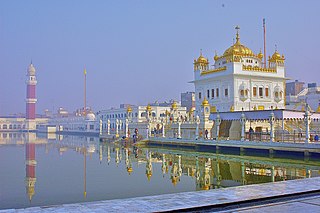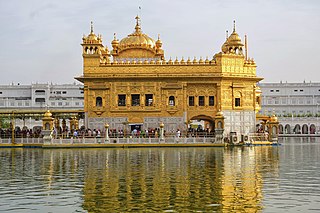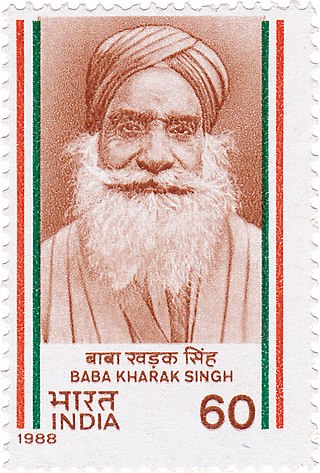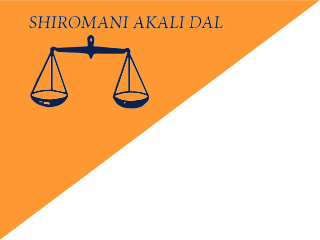Related Research Articles

Jarnail Singh Bhindranwale was an Indian militant. He was the leading figure of the Khalistan movement, although he did not personally advocate for a separate Sikh nation.

The Punjabi Suba movement was a long-drawn political agitation, launched by the Sikhs, demanding the creation of a Punjabi Suba, or Punjabi-speaking state, in the post-independence Indian state of East Punjab. Led by the Akali Dal, it resulted in the formation of the state of Punjab. The state of Haryana and the Union Territory of Chandigarh were also created and some Pahari-majority parts of the East Punjab were also merged with Himachal Pradesh following the movement.

The Shiromani Gurdwara Parbandhak Committee is an organization in India responsible for the management of Gurdwaras, Sikh places of worship in states of Punjab and Himachal Pradesh and the union territory of Chandigarh. SGPC also administers Darbar Sahib in Amritsar.

Gurdwara Sri Tarn Taran Sahib is a gurdwara established by the fifth guru, Guru Arjan Dev, in the city of Tarn Taran Sahib, Punjab, India. The site has the distinction of having the largest sarovar of all the gurdwaras. It is famous for the monthly gathering of pilgrims on the day of Amavas. It is near Harmandir Sahib, Amritsar.
Sardul Singh Kavishar (1886–1963) was an Indian newspaper editor, and a major figure in the Indian independence movement. Born in Amritsar, he was the second president of the All India Forward Bloc.

Tara Singh was a Sikh political and religious figure in India in the first half of the 20th century. He was instrumental in organising the Shiromani Gurdwara Prabhandak Committee and guiding the Sikhs during the partition of India, which he strongly opposed.
Sunder Singh Lyallpuri was a leading Sikh member of the Indian independence movement, a general of the Akali Movement, an educationist, and journalist. Lyallpuri played a key role in the development of the Shiromani Akali Dal, and in the Gurdwara Reform Movement of the early 1920s and also founding member of Central Sikh League. He took part in several roles in the establishment and growth of Indians independence.

Sardar Hukam Singh was an Indian politician and the third Speaker of the Lok Sabha and second Deputy Speaker of the Lok Sabha from 1962 to 1967. He was also governor of Rajasthan from 1967 to 1972.
Governor Ujjal Singh was an Indian politician who was a participant in the First Round Table Conference, opened officially by King George V on 12 November 1930. Ujjal Singh served as the Finance Minister of Punjab, Governor of Punjab, followed by acting Governor of Tamil Nadu. Prior to this he was one of Pre-Partition Punjab's largest landowners, owning thousands of acres in Hadali, Jaranwala, Mian Channu, Lyallpur, Montgomery, Sargodha and other areas.

Sant Fateh Singh was an Indian Sikh religious and political leader, and a key figure in the Punjabi Suba movement.

The Khalsa Akhbar, Lahore, was a weekly newspaper and the organ of the Lahore Khalsa Diwan, a Sikh society. Published from Lahore in the Punjabi language, the newspaper was established in 1886 and functioned sporadically till 1905. Founded by Bhai Gurmukh Singh, a professor of Punjabi at the Oriental College, Lahore, who also established the Khalsa Press in Lahore, the paper was taken over by Giani Ditt Singh, a scholar and a poet. It was one of the most prominent and influential Sikh periodicals prior to 1920.

A Jatha is an armed body of Sikhs that has existed in Sikh tradition since 1699, the beginning of the Khalsa. A Jatha basically means a group of people.

The Golden Temple (also known as the Harmandir Sahib, or the Darbār Sahib, is a gurdwara located in the city of Amritsar, Punjab, India. It is the pre-eminent spiritual site of Sikhism. It is one of the holiest sites in Sikhism, alongside the Gurdwara Darbar Sahib Kartarpur in Kartarpur, and Gurdwara Janam Asthan in Nankana Sahib.

The Singh Sabhā Movement, also known as the Singh Sabhā Lehar, was a Sikh movement that began in Punjab in the 1870s in reaction to the proselytising activities of Christians, Hindu reform movements and Muslims. The movement was founded in an era when the Sikh Empire had been dissolved and annexed by the British, the Khalsa had lost its prestige, and mainstream Sikhs were rapidly converting to other religions. The movement's aims were to "propagate the true Sikh religion and restore Sikhism to its pristine glory; to write and distribute historical and religious books of Sikhs; and to propagate Gurmukhi Punjabi through magazines and media." The movement sought to reform Sikhism and bring back into the Sikh fold the apostates who had converted to other religions; as well as to interest the influential British officials in furthering the Sikh community. At the time of its founding, the Singh Sabha policy was to avoid criticism of other religions and political matters.

The Akali movement, also called the Gurdwara Reform Movement, was a campaign to bring reform in the gurdwaras in India during the early 1920s. The movement led to the introduction of the Sikh Gurdwara Bill in 1925, which placed all the historical Sikh shrines in India under the control of Shiromani Gurdwara Parbandhak Committee (SGPC).

Baba Kharak Singh was an Indian playwright born at Sialkot in British India. He was involved in the Indian independence movement and was president of the Central Sikh League.

The Shiromani Akali Dal (SAD) is a centre-right Sikh-centric state political party in Punjab, India. The party is the second-oldest in India, after Congress, being founded in 1920. Although there are many parties with the description Akali Dal, the party that is recognized as "Shiromani Akali Dal" by the Election Commission of India is the one led by Sukhbir Singh Badal. The party has a moderate Punjabi agenda. On 26 September 2020, they left the NDA over the farm bills.

Sikhism in China is a minority religion in the People's Republic of China. Sikhism originated from the Punjab region of the northern Indian subcontinent.

Sardar Bahadur BhaiMehtab Singh (1879–1938) was a lawyer, freedom fighter and legislator who became closely associated with Gurudwara Reform movement and later became the president of the Shiromani Gurdwara Prabandhak Committee.

Bawa Harkrishan Singh was a politician from Punjab and freedom fighter.